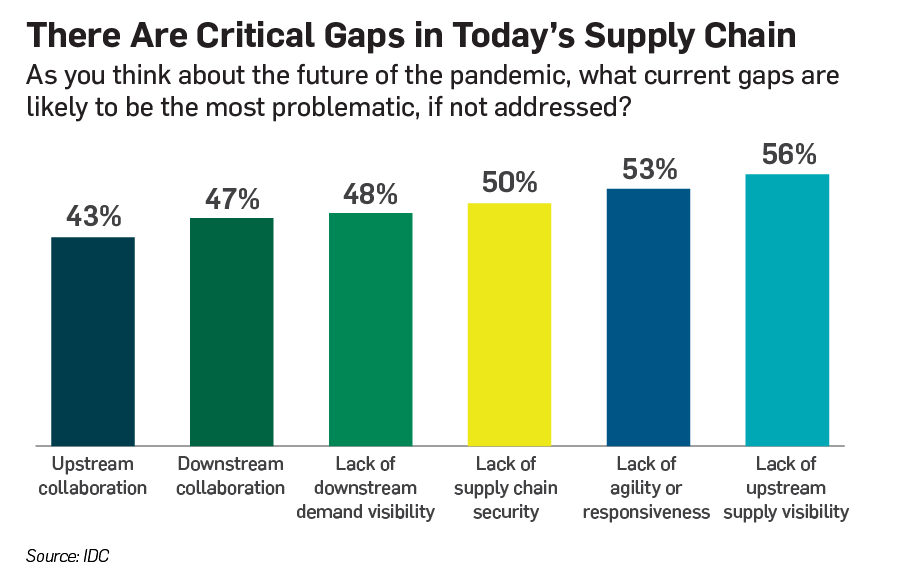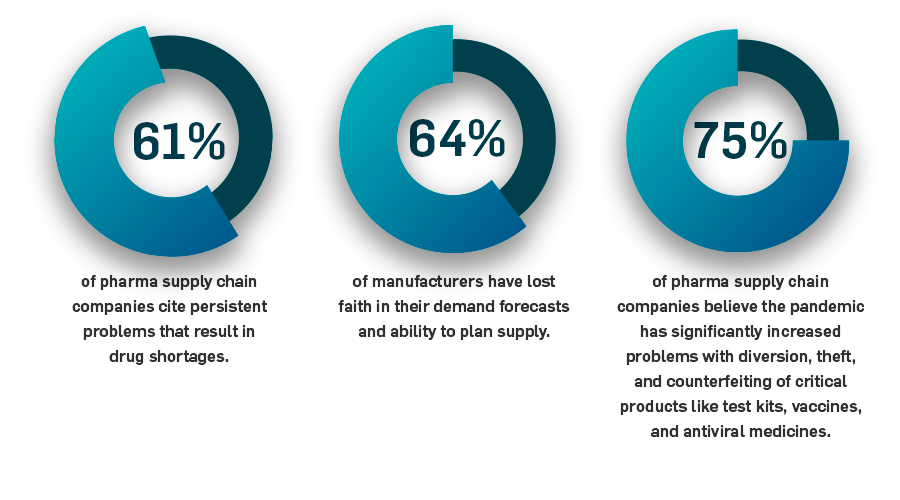Table of contents
Key Takeaways
-
Nearly half of pharma supply chain companies lack the resilience needed to effectively respond to major disruptions.
-
Only 5.6% of pharma supply chain companies say they are actively pursuing patient-centric transformation strategies.
-
Collaborating more closely with partners on a digital supply network can help organizations boost agility, responsiveness, and resilience.
COVID-19 ignited a chain reaction of disruption across the global pharma industry that led to drug shortages, rising costs, and a sharp decrease in the rate of on time, in full (OTIF) deliveries of medicines to patient in need—and companies can expect these kinds of disruptions to continue until long after the pandemic subsides, according to a new survey report from analyst firm IDC.
Whether it’s a new pandemic or another major source of disruption, the pharma supply chain companies poised for success will be those that view COVID-19—and the critical weaknesses it shined a light on—as motivation for embracing patient-centric, agile supply chain principles.

“The companies who are going to do better are going to transform their operating models from supply-driven to patient-driven,” predicts IDC Program Vice President and Supply Chain Strategies Practice Leader Simon Ellis, who presents the survey results in a new TraceLink on-demand webinar. “Companies that use data better and are able to link data to outcomes—in this case, patient outcomes—will outperform those that are not. It's about prioritizing resiliency."
IDC and TraceLink surveyed 532 companies across the end-to-end supply chain—including manufacturers, CMOs, wholesalers, and pharmacies—and found that the industry as a whole is in reactive mode and lacks the resilience required to maintain a high level of performance in the face of disruptions like those caused by COVID-19. Among the survey results:
 Additionally, the survey revealed that only a handful of respondents—just 5.6%—are currently reengineering operating models to build a more patient-driven supply chain.
Additionally, the survey revealed that only a handful of respondents—just 5.6%—are currently reengineering operating models to build a more patient-driven supply chain.
Who will succeed—and who will fail—in the era of supply chain disruption?
During the webinar, Ellis offers a list of the key characteristics that IDC believes will be crucial to achieving success in the era of increasing supply chain disruption. Companies poised for success will:
- Use the pandemic as a wake-up call that fuels the energy, urgency, and commitment needed to digitally transform the business and make agile patient service a top priority.
- Analyze current capabilities, identify major weaknesses exposed during the pandemic, and make fixing them a priority. For example, improving the ability to share accurate and actionable data for upstream and downstream supply chain visibility.
- Plan holistically for transformation across all functional departments and investigate platforms that enable the integration of planning and operations across the end-to-end demand and supply network.
- Focus on providing a resilient, responsive, reliable, and compliant product supply that enables the business to meet agreed-upon service levels.
- Collect and analyze downstream demand data from various sources to improve demand forecast accuracy and plan the product supply network.
- Strive to be digital pioneers by transforming operating models from supply-driven to patient driven.
Companies poised to struggle will:
- Deploy local, siloed improvement solutions and fragmented fixes for supply chain disruptions.
- Stick with traditional operational enterprise software vendors with limited cognitive and augmented analytics capabilities.
- Focus only on creating inventory stockpiles to help ensure agility.
- Fail to diversify agile supply management to multiple tiers.
- Behave like “digital laggards” and lack a well-defined digital transformation plan.
- Manage supply chain risk management by focusing solely on the reaction to a disruptive event, as opposed to taking proactive steps to avoid disruptions.
- Operate in supply-driven internal and external silos that are unable to share data and collaborate across functions and partners in the network.
“Hopefully, we won't have another pandemic for another hundred years, but there are other things coming. The disruptive nature of the supply chain appears to be with us now for a while,” Ellis said. “The kinds of things that are necessary to be resilient won't just help companies with COVID-19, it will help them with the other things that are on the horizon.”
Watch our on-demand webinar featuring IDC’s Simon Ellis to learn more.






